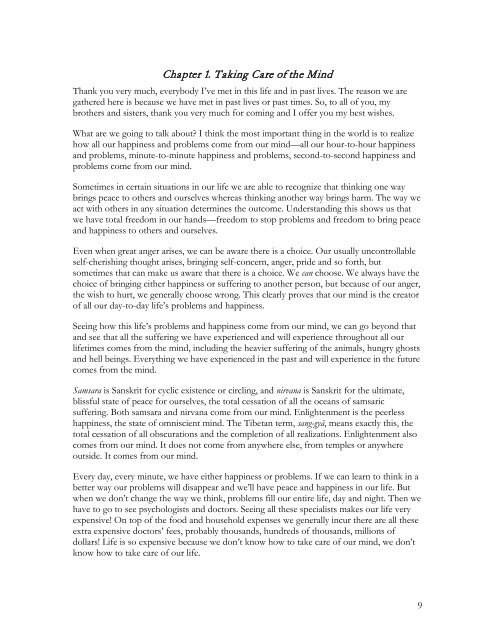Lama Zopa Rinpoche
55OTzl52A
55OTzl52A
You also want an ePaper? Increase the reach of your titles
YUMPU automatically turns print PDFs into web optimized ePapers that Google loves.
Chapter 1. Taking Care of the Mind<br />
Thank you very much, everybody I’ve met in this life and in past lives. The reason we are<br />
gathered here is because we have met in past lives or past times. So, to all of you, my<br />
brothers and sisters, thank you very much for coming and I offer you my best wishes.<br />
What are we going to talk about? I think the most important thing in the world is to realize<br />
how all our happiness and problems come from our mind—all our hour-to-hour happiness<br />
and problems, minute-to-minute happiness and problems, second-to-second happiness and<br />
problems come from our mind.<br />
Sometimes in certain situations in our life we are able to recognize that thinking one way<br />
brings peace to others and ourselves whereas thinking another way brings harm. The way we<br />
act with others in any situation determines the outcome. Understanding this shows us that<br />
we have total freedom in our hands—freedom to stop problems and freedom to bring peace<br />
and happiness to others and ourselves.<br />
Even when great anger arises, we can be aware there is a choice. Our usually uncontrollable<br />
self-cherishing thought arises, bringing self-concern, anger, pride and so forth, but<br />
sometimes that can make us aware that there is a choice. We can choose. We always have the<br />
choice of bringing either happiness or suffering to another person, but because of our anger,<br />
the wish to hurt, we generally choose wrong. This clearly proves that our mind is the creator<br />
of all our day-to-day life’s problems and happiness.<br />
Seeing how this life’s problems and happiness come from our mind, we can go beyond that<br />
and see that all the suffering we have experienced and will experience throughout all our<br />
lifetimes comes from the mind, including the heavier suffering of the animals, hungry ghosts<br />
and hell beings. Everything we have experienced in the past and will experience in the future<br />
comes from the mind.<br />
Samsara is Sanskrit for cyclic existence or circling, and nirvana is Sanskrit for the ultimate,<br />
blissful state of peace for ourselves, the total cessation of all the oceans of samsaric<br />
suffering. Both samsara and nirvana come from our mind. Enlightenment is the peerless<br />
happiness, the state of omniscient mind. The Tibetan term, sang-gyä, means exactly this, the<br />
total cessation of all obscurations and the completion of all realizations. Enlightenment also<br />
comes from our mind. It does not come from anywhere else, from temples or anywhere<br />
outside. It comes from our mind.<br />
Every day, every minute, we have either happiness or problems. If we can learn to think in a<br />
better way our problems will disappear and we’ll have peace and happiness in our life. But<br />
when we don’t change the way we think, problems fill our entire life, day and night. Then we<br />
have to go to see psychologists and doctors. Seeing all these specialists makes our life very<br />
expensive! On top of the food and household expenses we generally incur there are all these<br />
extra expensive doctors’ fees, probably thousands, hundreds of thousands, millions of<br />
dollars! Life is so expensive because we don’t know how to take care of our mind, we don’t<br />
know how to take care of our life.<br />
9


